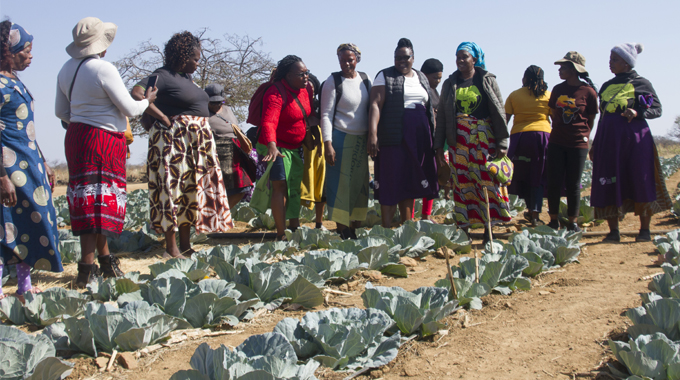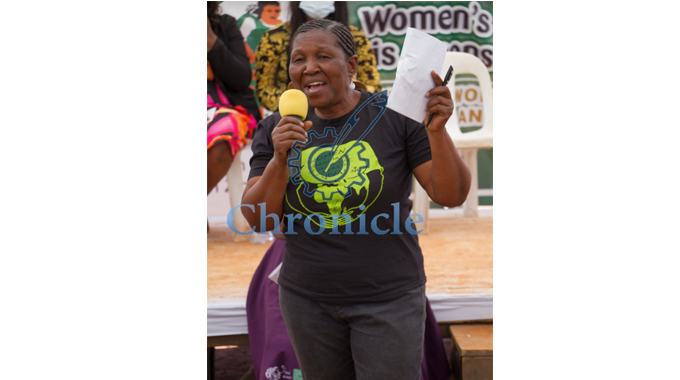
WATCH: Organisation empowers women with agricultural knowledge
Chronicle

lawrence thud
Most of the food we all eat was probably grown by female farmers, who constitute the majority of agricultural workers in southern Africa. Yet, despite women making up 52 percent of the population and being the majority agricultural workers in the region, they have access and control of less than 20 percent of the land in the region. At the turn of the millennium, women frustrated by this injustice began to form lobby groups to push for greater allocation of land rights.
Women farmers often bear the brunt of gender-based violence (GBV) and suffer the most as a result of the labor-intensive nature of farming due to climate change. In places with little or no mechanization, they work hard to continuously provide food for their families and communities.
 booby irrigation scheme
booby irrigation schemeIn most of Zimbabwe’s agricultural sectors, women are in charge of the day-to-day operations of crop and livestock production, while their male counterparts, who often work in cities, assume a kind of supervisory role. However, it is the men who usually own the land and decide from their urban bases how the income from agricultural produce is to be used.
In 2000, 14 rural female cotton farmers from Gokwe committed suicide out of bitterness following abuse by their husbands over money from selling their produce. It set up an organization that would promote women’s rights to land. The Women and the Land Association in Zimbabwe argues that women should have greater access and control over the land on which they work.
Women and land already in Zimbabwe have empowered members with technical and agricultural knowledge, which in turn has given them more confidence to advocate for greater land rights. Since its formation in 2000, the organization has organized over 31 000 rural farmers under the banner of the Rural Women’s Assembly, which is affiliated with the Southern Africa Rural Women’s Assembly. The gathering is a safe platform for rural women to meet, share experiences and challenges as well as find solutions to build resilience on the political, economic, environmental and health challenges they face.
The RWA held its 7th National Annual Meeting this year after a two-year Covid-19 restriction induced hiatus. The objective of the meeting is to facilitate knowledge exchange platform for rural farmers. More than 2,000 members from across the country gathered at Somwubu High School in Inyathi, Bubi District of Matabeleland Northern Province. Along with this, the regional members of Sarva were also present.
The Assembly also promotes software programs that have empowered rural women to advocate for leadership positions. Bubi District is characterized by high temperatures and low rainfall which has become more precarious due to climate change. Women and Land LED in Zimbabwe and established a 30 hectare solar powered irrigation scheme with the support of the Zimbabwean government. Established in 2019, the Buhlebuziel scheme has a pumping capacity of 12,000 liters per hour.
The availability of water has given life to 82 members of the scheme who are now engaged in horticulture and animal husbandry. Pfeffelfi Bishop, the plan’s chair, commended the role of traditional leadership in obtaining land for the scheme. “Our traditional leaders have been very supportive of our projects as they have allotted us more than 30 hectares for this scheme. We have been allotted land to build our houses around the plan as a security measure”, Bishop said.
“We appreciate the women and land in Zimbabwe for the assistance they have provided us, because we are now safe. We also acknowledge the technical assistance we have received from agricultural extension officers in ensuring good harvests and agricultural practices”, They said.
 Makoni Rural District Councillor, Theresa Marveic
Makoni Rural District Councillor, Theresa MarveicMakoni Rural district councillor, Theresa Marwei, is one of six councilors who benefited from the assembly’s solidarity campaign, where members are encouraged to rally behind them. At 70, Theresa, a school dropout, never thought she could run for and hold political office. “As a mother of 12 and a grandmother of 23, I thought my life had taken its course and never imagined myself getting into politics. The rural women’s gathering really enlightened me and inspired me to aim for the sky, said Cler Marwei, so I ran for office.
“I’m currently the gender focal person for my council. The work I’ve been doing with my team has resulted in a significant reduction in gender-based violence (GBV).” GBV is a social evil associated with poverty as spouses wrestle for control of less available resources. GBV is increasing due to the negative effects of climate change such as heat and extreme rainfall induced drought. It is imperative that rural farmers devise mechanisms to cope. In the national meeting, farmers exchanged information about drought resistant indigenous seeds.
Ms Nora Mlondolozzi, a member of the South Africa Rural Women’s Assembly, urged governments to promote seed exchange, although export restrictions on indigenous seeds between African countries were eased. “Our seeds are our medicine. We are challenging the African Union to facilitate the free flow of our seeds. It is sad that the ban on indigenous seeds continues, genetically modified foods and seeds are readily available across the continent. are being spread and shared”, she said.
 Ms. Nora Mondolozic
Ms. Nora MondolozicClimate change is ravaging rural communities as they are more vulnerable than urban residents due to lower incomes. Rural farmers are heavily dependent on rainfed agriculture, so they are coming up with coping mechanisms to capitalize on deficient and erratic rainfall patterns. In the two-day annual meeting, the women exchanged knowledge on water harvesting through methods like mulching and conservation farming.
As a way of providing relief to the hard-hit rural female farmer, the Liechtensteinischer Entwiklungs-Dienst (LED) is funding solar-powered irrigation schemes in the province of Matabeleland South, Matabeleland North, Manikland and the Midlands, covering a total of 36 hectares. is US$1.6. million. Regional Country Representative Ms. Elizabeth Etzinger emphasized the important role of the humanitarian sector in appreciating government initiatives in mitigation of hunger and drought.
“As we live in an era of climate change, solar-powered irrigation is the key to increasing food production thereby improving food security, increasing income and community resilience. Irrigation farming not only increases yield per hectare, but It also increases the variety of crops that can be grown and the food that can be produced throughout the year,” said Ms. Atzinger
 Regional Country Representative Ms. Elizabeth Atzinger
Regional Country Representative Ms. Elizabeth Atzinger“Irrigation schemes have resulted in improved crop production, increased income, and improved resilience against dry weather. These are important for women empowerment as they reduce their labor burden and save time making them more capable on productive economic activities.”
Mr. Dumisani Nyoni, Director, Ministry of Land, Agriculture, Fisheries, Water, Climate and Rural Development said that irrigation schemes are a major drought mitigation initiative.
“The government seeks support in terms of agricultural infrastructure from development partners as it appreciates its efforts towards achieving Vision 2030 of achieving a middle to upper income economy. This work is also contributing to the creation of inclusive economic growth for all citizens”, said Mr. Nyoni.
“Since women constitute 52% of the total population and most of them live in rural areas, where they are responsible for the production and processing of food crops, the schemes will ensure that women contribute to our economy, whose backbone is agriculture-based. “